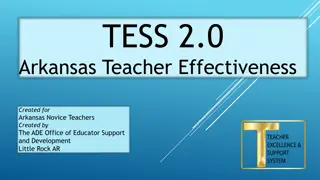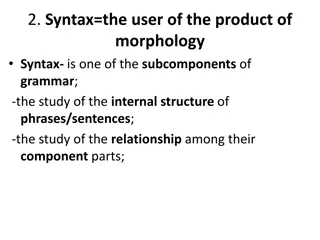
Latin Grammar Basics for Students: Verbs, Tenses, Nouns, and More
Explore the foundational aspects of Latin grammar including verbs in active voice, present, imperfect, perfect tenses, imperative moods, future tense, principal parts of verbs, interrogative sentences, and noun declensions. Enhance your understanding of Latin language elements with detailed explanations and examples.
Download Presentation

Please find below an Image/Link to download the presentation.
The content on the website is provided AS IS for your information and personal use only. It may not be sold, licensed, or shared on other websites without obtaining consent from the author. If you encounter any issues during the download, it is possible that the publisher has removed the file from their server.
You are allowed to download the files provided on this website for personal or commercial use, subject to the condition that they are used lawfully. All files are the property of their respective owners.
The content on the website is provided AS IS for your information and personal use only. It may not be sold, licensed, or shared on other websites without obtaining consent from the author.
E N D
Presentation Transcript
NOVICE LEVEL GRAMMAR (FOR NOVICE LEVEL GRAMMAR (FOR STUDENTS IN LATIN OR I) STUDENTS IN LATIN OR I) MarshLatin.wordpress.com
Verbs (Active Voice only) Verbs (Active Voice only) Present Imperfect Perfect Imperative Mood
Present Tense 1st 2nd 3rd 4th SUM O EO O IO SUM AS ES IS IS ES AT ET IT IT EST AMUS EMUS IMUS IMUS SUMUS ATIS ETIS ITIS ITIS ESTIS NAT ENT UNT IUNT SUNT
Imperfect Tense 1ST 2ND 3RD 4TH SUM ABAM EBAM EBAM IEBAM ERAM ABAS EBAS EBAS IEBAS ERAS ABAT EBAT EBAT IEBAT ERAT ABAMUS EBAMUS EBAMUS IEBAMUS ERAMUS ABATIS EBATIS EBATIS IEBATIS ERATIS ABANT EBANT EBANT IEBANT ERANT
Future Tense 1stand 2ndconjugations + sum, esse 1ST 2ND SUM ABO EBO ERO ABIS EBIS ERIS ABIT EBIT ERIT ABIMUS EBIMUS ERIMUS ABITIS EBITIS ERITIS ABUNT EBUNT ERUNT
Perfect Tense 1ST-4TH(3RDpp +) SUM I FUI ISTI FUISTI IT FUIT IMUS FUIMUS ISTIS FUISTIS ERUNT FUERUNT
Imperative Mood all conjugations in singular & plural, including abrupt imperatives negative imperatives 1ST 2ND 3RD 4TH NEGATIVE ABRUPT SINGULAR A E E I NOLI FAC, FER, DIC, DUC PLURAL ATE ETE ITE ITE NOLITE FACITE, FERTE, DICITE, DUCITE
ALIA Identification and translation of all principal parts 1STPP 2NDPP 3RDPP 4THPP PRESENT STEM INFINITIVE PERFECT STEM PERFECT PASS PART/ SUPINE I AM _____ING TO ________ I HAVE ______ED HAVING BEEN _____ED/ TO __________ Interrogative sentences with ne, n nne, num, quis, quid, cur, ubi, & quand .
1ST 2ND 3RD Nouns Nouns NOMINATIVE A US/R ? GENITIVE AE I IS Nominative Genitive Dative Accusative Ablative Vocative DATIVE AE O I ACCUSATIVE AM UM EM ABLATIVE A O E NOMINATIVE AE I ES GENITIVE ARUM ORUM UM DATIVE IS IS IBUS ACCUSATIVE AS OS ES ABLATIVE IS IS IBUS
Nominative Case 1stand 2nddeclensions, singular & plural NB: semifinals and finals may begin to introduce 3rddeclension subject Predicate nominative
Genitive Case 1stand 2nddeclensions, singular & plural NB: semifinals and finals may begin to introduce 3rddeclension possessive
Dative Case 1stand 2nddeclensions, singular & plural NB: semifinals and finals may begin to introduce 3rddeclension indirect object possession
Accusative 1stand 2nddeclensions, singular & plural NB: semifinals and finals may begin to introduce 3rddeclension direct object place to which prepositional phrases
Ablative 1stand 2nddeclensions, singular & plural NB: semifinals and finals may begin to introduce 3rddeclension place from which and place where accompaniment, means, & manner prepositional phrases
Vocative 1stand 2nddeclensions, singular & plural NOMINATIVE AND VOCATIVE ARE THE SAME EXCEPT 2ND DECLENSION SINGULAR! 2nddeclension vocative singular: US=E; IUS=I Thus Marcus becomes Marce, but Lucius becomes Luci
Adjectives and Adverbs Adjectives and Adverbs 1st& 2nddeclension adjectives Must agree in case, number, gender i.e. must be on same line on chart Adverbs from 1st& 2nddeclension adjectives Use an e for form adverbs Thus, laetus becomes laete
Pronouns Pronouns NOM EGO TU NOS VOS ego, ego, t t , , n s v s v s all cases EXCEPT genitive s s (accusative form only) n s, , GEN MEUS TUUS NOSTRUM VESTRUM DAT MIHI TIBI NOBIS VOBIS ACC ME TE NOS VOS ABL ME TE NOBIS VOBIS
Additional Grammatical Constructions Additional Grammatical Constructions Basic sentence construction (with transitive and intransitive verbs). E.g. Puer amat amat. . The semifinal and final rounds may or may not quiz basic indirect statement constructions with present tense verbs. E.g. Puer amare amare puellam puellam. . Puer puellam puellam Puer putat putat se se
Phrases, Mottoes, Abbreviations and Phrases, Mottoes, Abbreviations and Quotations (PMAQ) Quotations (PMAQ) AMSCO first year LESSON 79: https://quizlet.com/59172093/amsco-lesson-79-latin- words-and-phrases-used-in-english-flash-cards/ LESSON 80: https://quizlet.com/59175053/amsco-lesson-80-latin- abbreviations-used-in-english-flash-cards/ LESSON 84:
The Breakdown: Translation/comprehension (15%) True Grammar (15%) Vocabulary (10%) Derivatives/Mottos (5% each)
Translation/comprehension 15% from this, or three questions every round, will be questions involving sentence translation (Latin to English or vice versa) or comprehension of a couple Latin sentences. o
Question Archetype #9: The passage question Passage questions go as follows: Listen carefully to the following passage, which I will read twice. Then answer the question that follows in [Latin/English]. (It s very important important to specify what language the answer should be in.) Then a passage follows, and then The Question: and then the toss-up question, which should be in Latin, regardless of whether the answer is supposed to be in Latin or English. Try not to make the passage too long. Also, note that the question should always start with a question word like quis, ubi, c r, etc. Good certamen players will buzz after that first word. Example: TU7: Listen to the following passage, which I will read twice. Then answer the question that follows in Latin. Cer s in terr s ambulat. Quod Proserpinam f liam vid re n n potest, Cer s Proserpinam quaerit. Proserpina tamen de Plut ne sub terr ten tur. Animus deae Cereris vald dolet. TU: Ubi tene tur Proserpina? B1: Quem vide re no n potest Cere s? B2: Ve rum aut falsum: fi lia rapta , animus Cereris miserrimus erat? SUB TERR / TERR S / IN TARTAR PROSERPINAM / F LIAM (SUAM) V RUM
True Grammar 15% from this, or three questions every round, will be verb flip questions, noun-adjective agreement questions, case use questions, and the like. This could include questions about spoken/oral Latin, as well as command questions. o
Question Archetype #8: Commonality A close relative of the which of the following question, you begin this question with What do the following Latin [part of speech]s have in common? You can include some specifc hints in the question. Answers could be that they all are semideponents, have irregular imperatives, are first declension masculine nouns, are defective verbs, etc. Example: TU1: What do the perfect tense forms of the following Latin verbs have in common? Disc , curr , cad , tang , d THEY REPEAT THE FIRST CONSONANT OF THE WORD/REDUPLICATE B1: What is the linguistic term for this repetition? REDUPLICATION B2: Give the first and third principle parts of another verb that reduplicates in the perfect. (THEY CAN USE ST , STETI / TEND , TETEND /MORDE , MOMORD / TONDE , TOTOND / PEND , PEPEND / CAN , CECIN / PUNG , PEPUG / PARI , PEPER / PARC , PEPERC OR ANY OTHER VERB THAT REDUPLICATES IN THE PERFECT)
Grammar Questions: There are many, many ways to ask grammar questions. Included here are some ideas. You can ask students to: parse one or more variables of a declined/conjugated word (e.g. give the person, #, tense, voice, and mood of appropinqua ba mini ) GRAMMAR FLIP: alter one or more variables of a declined/conjugated word (e.g. change appropinqu b min to the active voice; make canis accusative; make altum comparative; make b n rum masculine, make fiat indicative---these are good bonus questions) fill in the blank (e.g. use the verb esuri to complete the sentence: si cibum consumerem, ego no n nunc [answer: esur rem]) complete an analogy (e.g. curritis : currimus :: ambula s : ambul ]) translate a sentence English Latin or Latin English. (You may want to specify a construction, e.g. using a passive periphrastic, say in Latin we must flee. ) [answer:
Vocabulary o 10% from this, or two questions every round, will be vocabulary identification questions.
Question Archetype #2: The pure definition This is a basic vocabulary question. The canonical way of phrasing it is Quid Anglic significat English. Try not to use conjugated verbs, which test understanding of grammar, and should therefore be asked with a different type of question. Example: ? It must be answered in TU8: Quid Anglice significat hortus? GARDEN B1: Quid Anglice significat arbor? TREE B2: Give an English derivative from each of these words. HORTICULTURE, ARBOR(ETUM)/ARBOREAL, ETC.
Question Archetype #3: Differentiated meanings Another common vocabulary question, this should be phrase Differentiate in meaning between[/amongst] [and ]. The bonus questions can be more differentiate questions, or they can be related language questions. and Example: TU2: Differentiate in meaning between me ns and me nsa. M NS=MIND, M NSA=TABLE B1: What is the name of the International High IQ Society that derives from one of these words? MENSA B2: From which of these words does MENSA derive? M NSA (TABLE)
Question Archetype#4: Synonyms and Antonyms Example: TU1: Give a synonym in Latin for the word pelagus. MARE/AEQUOR/PONTUS/ALTUM B1: Using the word pelagus, how would you say in Latin the cold sea ? PELAGUS FR GIDUM B2: Give an antonym in Latin for the word fr gidus. CALIDUS/CALDUS/IGNEUS/FLAGRANS
Derivatives/Mottos o 5% from this, or one question every round, will be a question on English words derived from Latin. o 5% from this, or one question every round, will be a phrases, mottoes, abbreviations and quotations question (PMAQ)
Question Archetype #5: The basic derivative question Simply asks for the derivation of a particular English word. Should be phrased: From what Latin [part of speech], with what meaning, do we derive the English word ? It is very important to include the part of speech, since there are many related nouns, verbs, adjective, etc. in Latin, and whether a word derives from one part of speech or another is an issue that can be avoided by specifying which one you re looking for in the question. Example: TU3: From what Latin verb, with what meaning, do we derive the English word somnambulist? AMBUL /AMBUL RE, [I/TO] WALK B1: From what Latin noun, with what meaning, do we derive the same word? SOMNUM, SLEEP B2: What does the word somnambulist mean? SLEEPWALKER
Question Archetype #6: Name that derivative The answers to these questions are English derivatives. You describe the meaning of the derivative and from what Latin word it derives, and they have to name the English word. Example: TU2: What English word meaning "stout" or "portly" is derived from the Latin word meaning "body"? CORPULENT B1: What English word meaning "narrow-minded" is derived from the Latin word meaning "province"? PROVINCIAL B2: What English word, synonymous with "reverence," is derived from a third declension Latin word meaning "man"? HOMAGE You'll note that this example does not actually ask for the Latin words from which they derive; that knowledge is almost necessary for getting the question right, so you don't need to ask for it. For an easier overall question, though, you could ask for it on the first bonus and the second bonus could be , for example, to name another derivative from that Latin word.
Question Archetype #7: Which of the following Start with Which of the following (Latin words/nouns/verbs/etc.) . They re supposed to pick out the word from the list that is unlike the others, whether it is of a different gender, tense, case, derivation, etc. This can be used to test vocabulary, derivatives, and all kinds of grammar. Example: TU5: Which of the following English words does not derive from the same Latin word as the others? permission, admit, misery, emissary, committee MISERY B1: From what Latin word, with what meaning, does misery derive? MISERUS/A/UM, SAD B2: From what Latin verb, with what meaning, do the other 4 words in the list derive? MITT /MITTERE, (I/TO) SEND






















